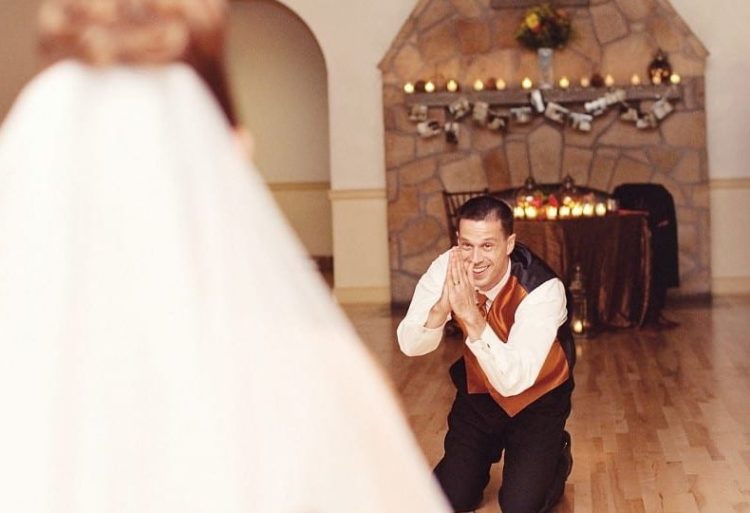
Of all the skills you will need to master in order to keep your marriage happy, perhaps the most important is the art of the apology.
Those two little words—“I’m sorry”—are deceptively tricky, and difficult for most men to say (unless you are Canadian, in which case it’s almost a twitch).
For the rest of us, here’s the who, what, and why of how to apologize. (We’ll leave the where up to you.)
What Is An Apology?
First off, you need to fully understand what an apology is. An apology is not an admission of guilt: it’s an expression of regret. Saying you’re sorry doesn’t mean you are fundamentally wrong or a bad person. It simply means you are acknowledging that you have caused hurt, and that you will never do it again. That’s all.
Who Needs To Apologize?
Anyone who isn’t perfect should learn how to apologize.
If you’re perfect, you can stop reading here.
Why Is It So Hard To Apologize?
It takes courage to apologize. Maybe you’re feeling ashamed of something you’ve done, but worry that apologizing will make you vulnerable or weak. This has led some people to adapt of philosophy of “never apologize, never explain.” These people are probably not happily married.
They are also idiots, because clearly the ability and willingness to apologize is a sign of strength, not weakness. Sorry is the new black: it’s always in style.
Why Apologize?
Apologizing has many benefits that can support the health of your relationship.
One benefit of apologizing is that it allows the person to whom you are apologizing to feel respected and valued. With feelings of respect and value as opposed to your wife or girlfriend going to bed angry while you sit alone at the kitchen table staring glumly into another Bud Light Lime.
A well-timed apology opens up lines of communication and helps rebuild trust. It shows that you understand you’ve done something hurtful and you don’t want to do it again. It’s a powerful way to express love and respect, and restore dignity to someone who feels hurt.
But it’s not only good for them: it’s also good for you. Apologizing can build your own self-esteem. Everyone makes mistakes. Real men take responsibility.
How To Apologize In Four Easy Steps:
1. Say Two Little Words
In general, we are big fans of creativity, but an apology is not the time to reinvent the wheel. You have two choices. Either start with “I’m sorry” or “I apologize.” This type of language shows you are taking responsibility.
You should NOT say something like, “I’m sorry you think I cheated on you.” That’s a passive aggressive way of shifting blame. This is a common tactic when people don’t really feel contrite.
Begin by stating clearly that you feel remorse, not because you got caught, and not because she flipped out on you. You must communicate that you are sorry because you recognize you did something hurtful.
2. Empathize
The not-so-secret key to a successful apology is: don’t make it about you.Think about the other person’s feelings, and how you hurt them. And be ready to absorb some anger when you bring up whatever you did, so be patient and try to listen.
3. Apply The Remedy
It’s one thing to say you’re sorry. Words matter, but actions count even more. If possible, you should take some appropriate action to remedy the situation.
This step requires thoughtfulness and honesty. There are some mistakes that cannot be easily fixed.
For example, if you accidentally drop your fiance’s priceless vase–a family heirloom–you can’t just glue it back together or offer to buy a replacement at Kmart.
You have to think carefully about concrete steps you can take to repair whatever damage you have done. And don’t over promise, as that will only make things worse in the long run.
Try saying something like, “I’m sorry I broke that genuine Ming vase. I am going to take the pieces to a professional art restoration expert and see if the piece can be restored.””
4. Don’t Be A Repeat Offender
Repeating yourself in conversation is an irritating trait. Even more irritating is repeating the same behavior. The most important thing when apologizing is to make a commitment to try to change.
This doesn’t mean you won’t slip up. But you should take some immediate steps to show you are serious about trying to learn from your mistakes.
For example, you could say something like, “I know I can be really careless with your stuff, and I’m going to be a lot more careful going forward.”
How Not To Apologize
In case the previous four steps weren’t clear enough, here are four things to avoid when you apologize:
1. Making It Anything Less Than Heartfelt
If you’re nervous about fumbling your words, it’s fine to write your apology in a letter or email, or you can practice alone in front of a mirror. But don’t write it down and read from a printed page. You’ll sound like a politician, and your apology will suffer for it.
2. Waiting Too Long
An apology is like a nectarine. It’s wonderful and delicious within a few days of ripeness, but if you wait too long, it quickly turns rotten.
Why does even the most beautiful apology have an expiration date? Because much of an apology’s power comes from the urgency with which it’s delivered. You shouldn’t feel at peace with yourself until you’ve made amends with the person you’ve wronged. Wait too long and it looks like you’re just throwing it in as an after thought–which says you aren’t sorry at all.
3. Using Excuses
It’s OK to provide some context, but don’t delve into long explanations or try to shift the blame. For example, don’t say, “I’m sorry I fell asleep when you were telling me about your day at work. It’s just that I had had a lot to drink at dinner and frankly, your job is incredibly uninteresting.”” Honesty is crucial, but so is tact.
4. Expecting Quick Absolution
It’s great that you’ve apologized, but don’t expect instant forgiveness. You cannot say you’re sorry for forgetting her birthday, then try to finesse the moment into some sexy time. That’s just disrespectful. You have to be realistic: give your girl space and time to cool off. Allow your apology to settle in.
What Happens When You Don’t Apologize?
If you never apologize you may think you are being strong, but in reality, you are burning up a valuable resource: trust. At some point, you’ll run out of trust and end up sleeping on the couch. Then on a lawn chair. And finally in a cot at the men’s shelter. Hurting someone you love is ultimately self-defeating (and bad for your back).
Sometimes, it’s more important to be happy than be right. Even if you’re not 100% to be blame, swallow your pride, think about what you did do wrong, and ask for forgiveness.

















